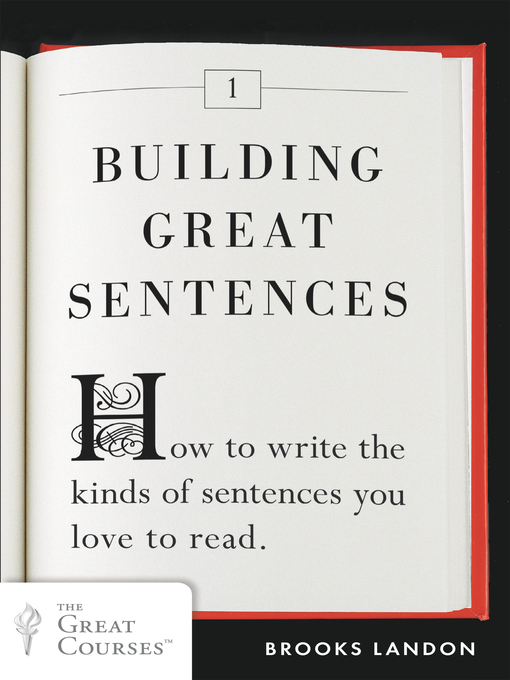Building Great Sentences
How to Write the Kinds of Sentences You Love to Read
Great writing begins with the sentence. Whether it’s two words (“Jesus wept.”) or William Faulkner’s 1,287-word sentence in Absalom! Absalom!, sentences have the power to captivate, entertain, motivate, educate, and, most importantly, delight. Yet, the sentence-oriented approach to writing is too often overlooked in favor of bland economy. Building Great Sentences teaches you to write better sentences by luxuriating in the pleasures of language.
Award-winning Professor Brooks Landon draws on examples from masters of long, elegant sentences—including Don DeLillo, Virginia Woolf, Joan Didion, and Samuel Johnson—to reveal the mechanics of how language works on thoughts and emotions, providing the tools to write powerful, more effective sentences.
-
Creators
-
Publisher
-
Release date
June 25, 2013 -
Formats
-
Kindle Book
-
OverDrive Read
- ISBN: 9781101614020
-
EPUB ebook
- ISBN: 9781101614020
- File size: 746 KB
-
-
Languages
- English
-
Reviews
-
Kirkus
May 1, 2013
Veteran professor Landon (English/Univ. of Iowa; Understanding Thomas Berger, 2009, etc.) urges a return to the sentence theories and pedagogy of Francis Christensen, whose ideas about cumulative sentences held sway for about a decade 40 years ago. The author outlines his objectives and beliefs early on, principal among them the notion that longer sentences are better sentences. The remainder of the book describes in detail the various ways to accomplish this aim. Landon clarifies the difference between grammar and rhetoric, defines a "kernel sentence," then wades into the Grammar Sea, where he soon is thigh- and chest-deep in verbals, left- and right-branching sentences, dangling modifiers, "syntagmatic and paradigmatic aspects," the concepts of sentence rhythm and a writer's style, periodic and "suspensive" sentences, "phatic expressions," balanced sentences and writing in triplets. He ends with what he calls "master sentences," quoting examples from Pynchon, Didion and Berger (to whom he often alludes). This is no simple self-help text, despite the obligatory exercises at the end of each chapter. Landon aims at an educated, sophisticated audience, as this sentence illustrates: "This new category of suspensive structures consists largely of 'phatic' expressions whose functions are more social than discursive, frequently adding little or no propositional meaning to the sentences they extend." Got that? There's also an odd archaic whiff about some of his allusions. Although he mentions Google and iTunes, he also alludes to Dragnet and Morse code, and virtually all of his literary examples are from canonical writers--nothing here from Fifty Shades of Grey or even Stephen King. Landon does suggest that all of the techniques he outlines should be in the service of something--not just long sentences for their own sakes--and that writers should vary sentence length, a good idea. Passionate and erudite, but with sharply focused appeal.COPYRIGHT(2013) Kirkus Reviews, ALL RIGHTS RESERVED.
-
Formats
- Kindle Book
- OverDrive Read
- EPUB ebook
subjects
Languages
- English
Loading
Why is availability limited?
×Availability can change throughout the month based on the library's budget. You can still place a hold on the title, and your hold will be automatically filled as soon as the title is available again.
The Kindle Book format for this title is not supported on:
×Read-along ebook
×The OverDrive Read format of this ebook has professional narration that plays while you read in your browser. Learn more here.

